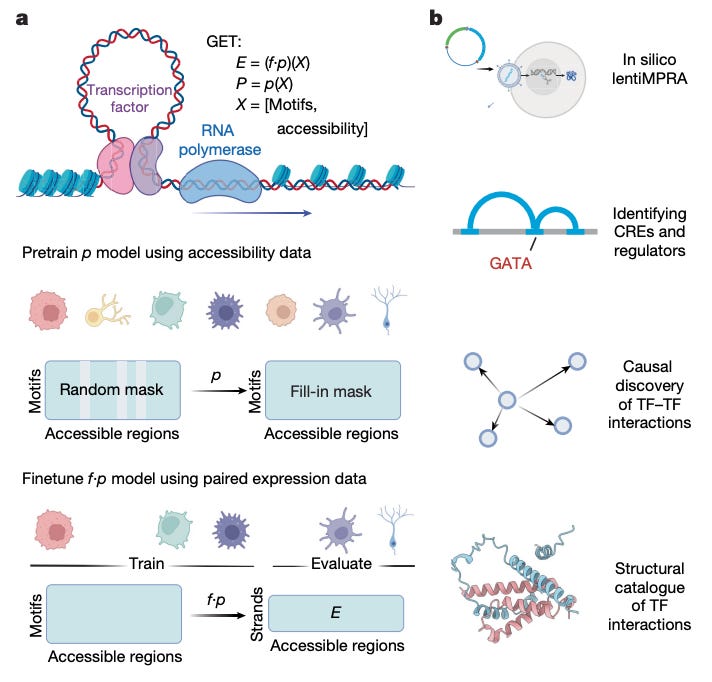📢 Highlights
Australian-Chinese Team Develops AI Tool, ProtChatGPT, for Protein Research
Retro Biosciences, OpenAI Develop New Model for Longevity-focused Cell Reprogramming
Neomorph Adds AbbVie to Growing List of Billion Dollar Pharma Partnerships
Not yet a member of our super awesome slack community of >8500? Join HERE 🤗
👀 In Case You Missed it ..
ProtChatGPT: Towards Protein Understanding with Hybrid Representation + LLM's
Researchers from the University of Technology Sydney and Zhejiang University have introduced ProtChatGPT, an AI system that connects large language models (LLMs) with protein research. It allows users to upload protein sequences, ask questions, and receive detailed answers. The system incorporates multi-level protein encoding sequence, secondary and tertiary structures processed through a custom PLP-former for accurate information retrieval. The models Protein Context Gating (PCG) module improves structure alignment through contrastive learning, enabling applications such as mutation analysis, disease associations, and protein design. With its open-source code and pre-trained model, ProtChatGPT aims to support protein research and foster scientific collaboration.
OpenAI Develops New Model, GPT-4b, for Protein Engineering and Life Extension
In a much anticipated move OpenAI has partnered with longevity science biotech Retro Biosciences, a San Francisco-based research company, to develop a model named GPT-4b micro for reprogramming mature cells into stem cells. Scientists at Retro used a prompting approach similar to the “few-shot” method to obtains suggestions for redesigns of Yamanaka proteins. According to the MIT Technology Review, OpenAI CEO Sam Altman is Retro’s biggest investor and personally funded the company to the tune of $180 million. This collaboration marks OpenAI’s entry into the TechBio space and its collaboration with Retro may reveal insights on the potential of applying AI to extending human lifespan by targeting stem cell efficiency. Critics in conventional pharma look at the move as yet another "tech bro” investing in longevity programs that serve themselves and the healthy few that can afford such elective interventions.
Behind the Deal: Neomorph Strikes $1.64B Partnership with AbbVie
Neomorph has secured a partnership with AbbVie worth up to $1.64 billion in option fees, milestones, and royalties, focusing on molecular glue degraders for oncology and immunology. This marks Neomorph’s third major collaboration since its 2020 founding, following deals with Biogen ($1.45B) and Novo Nordisk ($1.46B). The agreement reflects a growing industry trend, with companies like Novartis and Roche also investing heavily in protein degradation technologies. For AbbVie, this collaboration diversifies its pipeline beyond established immunology blockbusters and positions it at the forefront of an emerging therapeutic approach. Molecular glue degraders represent a novel class of small molecules designed to selectively induce degradation of disease-driving proteins, including those previously considered “undruggable”. This approach could revolutionize treatments in oncology and immunology, addressing high-value targets across multiple therapeutic areas. The deal structure, combining upfront payments with milestones and royalties, highlights Big Pharma’s increasing reliance on external innovation to de-risk development pipelines. It also showcases how platform companies like Neomorph can leverage strategic collaborations to accelerate growth while retaining control over their innovative technologies.
Manas AI secures $24.6 Million for AI Cancer-Research
In a curious turn of Silicon Valley seeking entrance into biotech, Reid Hoffman, a tech entrepreneur and venture capitalist widely known for co-founding the social media platform LinkedIn, has raised funding for Manas AI, a startup that will use AI for drug discovery and "will first focus on breast cancer, prostate cancer and lymphoma before broadening its scope to include other illnesses." Hoffman is co-founding the startup with Dr. Siddhartha Mukherjee, a physician well-known for his book "The Emperor of All Maladies." Dr. Mukherjee is quoted in the Wall Street Journal saying "he plans for Manas, named after the Sanskrit word for 'mind,' to make money primarily by developing and selling its own drugs." General Catalyst and Greylock Partners invested in the $24.6M funding round and Manas plans to use Microsoft-owned data centers.
A Foundation Model of Transcription Across Human Cell Types
In a recent publication in Nature, researchers introduced the General Expression Transformer (GET), a foundation model for transcriptional regulation designed to predict gene expression across 213 human cell types using chromatin accessibility and sequence data. GET achieves experimental-level accuracy in unseen cell types and outperforms previous models in tasks such as regulatory element identification and transcription factor interaction mapping. The model uncovering universal and cell-type-specific regulatory grammars, provides insights into long-range enhancer-promoter interactions and disease-linked genetic variations. This is a significant step toward understanding gene regulation and its implications for health and disease.
Novo-Backed Windward Bio Secures $200M in Funding and in-Licenses Biologics
Windward Bio, a Switzerland-based biotech backed by Novo Holdings, has raised a $200 million in Series A financing to advance small-molecule oncology programs across multiple indications. Simultaneously, the company announced a partnership worth up to $970 million, paying 45M upfront to license rights to Kelun-Biotech and Harbour BioMed’s clinical-stage monoclonal antibody. The biotech paid the co-developers $45 million in upfront and near-term milestone payments—using both cash and equity interest in Windward’s undisclosed parent company. The financing round was co-led by OrbiMed, Novo Holdings and Blue Owl Healthcare Opportunities.
Computational Protein Design for Neutralizing Snake Venom Toxins
Researchers at the Technical University of Denmark in Lyngby and at the Baker Lab at the University of Washington have published a paper which highlights the use of artificial intelligence for effectively neutralizing deadly snake venom toxins. The paper highlights the high cost and limited efficacy of polyclonal antibodies derived from the plasma of immunized animals against three-finger toxins (3FTx). They used deep learning methods for generating de novo proteins which demonstrate “remarkable thermal stability, high binding affinity and near-atomic-level agreement with the computational models.” This breakthrough could lead to safer, more accessible, and cost-effective antivenom treatments, particularly beneficial for neglected tropical diseases. Data is available on the PDB and code explanation and examples of binder design using RFDiffusion are available on Github.
Basetwo's $115M Raise Aims to Transform Pharma Production with Applied AI
Toronto based pioneer in AI-driven pharmaceutical manufacturing, Basetwo, has raised $115 million in Series B funding to scale its first-principles optimization platform. The company’s technology integrates machine learning with physics-based models to streamline bioprocessing, enhance yield predictability, and minimize batch failures. Investors, including Coatue and a16z, see Basetwo’s platform as a key enabler for biopharma companies seeking to reduce production costs and improve supply chain robustness. The funding will accelerate deployments with leading pharma manufacturers and expand applications beyond biologics to small-molecule drugs and cell therapies into emerging modalities.
Mayo Clinic Teams with NVIDIA to Advance AI in Pathology
NVIDIA and clinical care giant Mayo Clinic have launched a strategic collaboration to integrate AI-powered digital pathology into clinical workflows. Using NVIDIA’s DGX Cloud and MONAI framework, the partnership will develop deep learning models for cancer diagnostics, biomarker discovery, and pathology automation. The collaboration will leverage Mayo's vast data stores, produced through manual and robotic lab work- their database includes 10 million patient records and 20 million high-resolution slide images. The AI models will analyze whole-slide images to identify patterns that human pathologists might miss, enhancing diagnostic accuracy and reducing turnaround time. With many parallel efforts underway in both institutional and corporate settings, time will tell if their efforts will prove meaningfully differentiated from the like of Microsoft's GigaPath.
Quantum-Computing-Enhanced Algorithm Unveils Potential KRAS Inhibitors
An academic-industry partnership comprising the University of Toronto, Insilico Medicine, and other institutions have published research on the use of quantum computing for the development of KRAS inhibitors for cancer therapy. The paper highlights the use of a “hybrid quantum-classical model” which involves utilizing a 16-qubit quantum computer alongside traditional machine learning to generate and evaluate new drug candidates. They identified 15 promising compounds for synthesis and experimental testing. Insilico Medicine provided the initial dataset of 650 experimental ligands and the group used computational screening methods to increase the size of the training set for the generative model. Datasets and code for running the generative model are available via Zenodo.
AI Veterinary Startup Lupa Nets $4M to Transform Pet Healthcare
London-based Lupa, an AI-driven veterinary health platform, has raised $4 million in seed funding to enhance diagnostics and personalized pet healthcare. The company utilizes AI to analyze clinical data, detect early disease markers, and recommend tailored treatment plans for pets. Lupa’s platform integrates electronic health records and imaging data to assist veterinarians in making data-driven decisions, reducing misdiagnoses and improving pet outcomes - very much like the human equivalents seek to do in conventional healthcare settings. The funding, led by early-stage investors including firstminute capital, 2100 Ventures, and Exor Ventures, will be used to expand the platform’s capabilities and validate its offerings prior to a full go to market.
🗓️ Upcoming BiB Events
See our handy dandy Lu.ma event calendar HERE, please RSVP so folks can plan accordingly!
Copenhagen Bits in Bio x DI Bio – Tuesday, January 28th
Thank you Alexander Junge for organizing!
Minneapolis-St. Paul Get Together – Tuesday, January 28th
Thank you to organizer Brian Repko!
Boston Ganymede x Bits in Bio Happy Hour – Tuesday, January 28th
Thanks Nunzio Rosselli for organizing!
Austin Meetup – Thursday, January 30th
Thank you to Kesav Varanasi for organizing!
📰 Top Community Conversations
@ Ish Girwan is trying out ChatGPT o1 and DeepSeek R1 on proteomics basics - guess who won!
🏢 New Job Openings
Notable postings below - over 100 more on our community job board!
AI Internship at Sable
Lab Automation Engineer at Adaptyv Bio
Product Owner – Lab Automation Platform at Unite Labs
Research Associate at Kyomei Bio
Scientist / Senior Scientist (Protein Biochemistry) at CryoBio
Senior Engineers at Amass Technologies
Senior ML Ops Engineer at Flagship Pioneering FL104
Software Engineer (Backend) at Plasmidsaurus
🙋 🙏 Community Asks
Feedback: How is the Newsletter doing? We’re trying different formats/content. In case the hyperlink above didn’t get your attention, maybe a bright orange button will!
Volunteer: Want to get involved with Bits in Bio, meet new members across the community, and learn about the ecosystem? We are looking for volunteers to help us create great content and manage the community.
🙏 Thank you for being a BiB Weekly reader!
We want to deliver what matters most in Bio AI and would love your feedback on how we can do better. Please weigh in as anon here or DM me directly!












